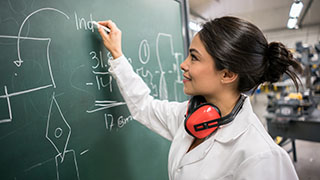Until a few months ago, Ambrose was headed to Anne Beers Elementary in Southeast. But the coronavirus pandemic shut down his school, leaving online learning as one of the few safe alternatives. A kitchen table is now a classroom desk.
“The first week was a little tough for everybody, but we all became more acclimated to the computer,” said Ambrose Lane Jr., the boy’s father. “I’m surprised by how fast he’s learning to do so much by himself.”
I’d been talking with Lane about his work as a community activist in the District when he mentioned helping his son with schoolwork. That was a striking contrast to much of what I’d been reading regarding Black students and virtual learning.
Whenever I came across accounts of people who were making the most of the remote learning, they were always white and wealthy — and often portrayed as being terribly concerned about the well-being of others, yet contributing to an ever-widening education gap.
“With great uncertainty about the new school year, wealthier, predominantly White parents are using their resources to secure educational options for their individual children,” Erica Turner, an associate professor at the University of Wisconsin-Madison, wrote in her “Equity in Pandemic Schooling” action guide.
“By abandoning public schools or cornering scarce educational resources (while many less-advantaged children cannot meaningfully access school at all), they are engaging in white flight and opportunity hoarding.”
It is true that there are Black families — and families of every race and ethnicity — who are living in low income homes without Internet access, stretched and stressed about how to educate their kids while keeping a roof over their heads and food in the refrigerator.
But there are also families such as the Lanes. Young, Black, educated, determined to do whatever it takes to ensure their children get the best education possible. And work to expand educational opportunities for others as well.
“We are very fortunate to be able to work — and to be able to work from home,” said Nure Green Lane, Ambrose’s mother. “I believe that when you’ve been blessed you are obligated to do more to help others.
She is program coordinator for the Congress Heights Family Success Center at the Far Southeast Family Strengthening Collaborative. The organization provides support services for low income families. There’s a program that helps men improve their relationships with their children — and the mothers of those children. And there’s another, called the Nurturing Parenting Program, that helps mothers and fathers respond to the developmental and educational needs of their children.
That kind of help is especially needed as parents try to figure out how to educate their children during a pandemic.
Ambrose Lane Jr. is founder and chair of the Health Alliance Network in D.C. and a co-founder of the Black Coalition Against COVID. Both organizations seek government policy solutions to addressing racial disparities in health outcomes.
He attended Howard University; his wife attended the University of the District of Columbia.
By their actions, the Lanes set a powerful example about the importance of education and the role of the parent as a child’s first teacher.
Before young Ambrose signs on for class most mornings, he and his mother will go outdoors for recreation. “Blowing bubbles or drawing with chalk on the driveway,” she said.
Or his father will take him along for a morning walk through the neighborhood. The activity helps put the boy in a relaxed frame of mind before settling into a day of computer studies.
“Technology being what it is, there are going to be times when things don’t always work like it should,” Green Lane said. “If there is a lag time, or the computer freezes or accidentally logs out, we want him to be able to manage his emotions.”
That’s a tall order, even for many of us adults.
The Lanes do a lot of their own work through Zoom meetings and must coordinate monitoring their son while he’s doing school work.
“Our son doesn’t make a distinction between being ‘in class’ and ‘at home,’ ” Green Lane said. “I’m still mommy all the time and he’s at home all the time.”
When both parents were occupied recently and their son couldn’t get the answer to a question, he made a ruckus. Green Lane had to create a new system for communicating — colored index cards that indicate if her son had a school-related question for her or a more pressing matter. Setting boundaries, teaching patience and decorum.
“Before we started this remote learning, parents didn’t have to be so creative,” she said. “But I see now that teachers have to be creative all the time. This is not an easy job, and even though my husband and I are educated, we are not cut out to be our son’s primary schoolteacher.”
That realization has made the Lanes more sympathetic to the struggles of single parents trying to educate their children at home. They have vowed to press harder for more parental support services, such as day care and tutoring.
Green Lane noted that D.C. Mayor Muriel E. Bowser recently pledged to spend more than $3 million to provide 25,000 low income residents with Internet access. That’s on top of providing nearly all of the city’s 55,000 public school students with computers in preparation for remote learning.
“We have been screaming about closing the digital divide for years, calling for more equitable distribution of education resources, and were always told there was no money,” Green Lane said. “But then the pandemic emergency hits and suddenly there is the money. So, from now on, we’re not taking no for an answer. We still have an equity gap. And it urgently needs closing. So let’s do it and not keep saying there is no money.”
She and other neighbors have already begun organizing for the city’s next budget hearings, set for spring, where they will advocate for more money to be spent on schools where pupils have the greatest needs.
“Now that people recognize the inequities in our society doesn’t mean they will automatically get fixed,” she said. “It doesn’t work that way. We’re still going to have to fight just as hard to solve these problems.”
Meanwhile, they will continue making sure their own son gets whatever he needs to continue his education.
“When the pandemic hit and the schools closed, we didn’t know when they would open again,” Lane said.
But that didn’t mean he was just going to sit around and wait to find out.
“I started buying workbooks for first and second graders,” he said. “The school buildings might be closed. But school is open around here, 24/7.”





More Stories
Launch of Altura – a Blended Learning Solution from Macmillan Education India
How education can succeed in times of crises
Abdul Aziz Al Ghurair Refugee Education Fund Partners with Discovery Education